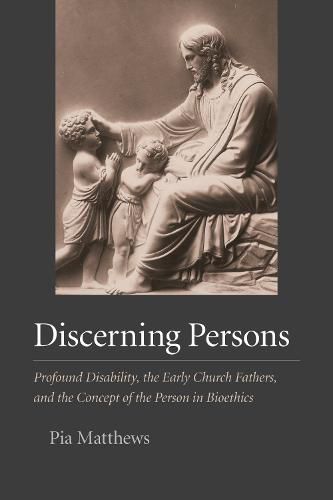Readings Newsletter
Become a Readings Member to make your shopping experience even easier.
Sign in or sign up for free!
You’re not far away from qualifying for FREE standard shipping within Australia
You’ve qualified for FREE standard shipping within Australia
The cart is loading…






Drawing on rich insights from the early Church Fathers, Discerning Persons addresses the neglected issue of disablism and how discriminatory attitudes fail to treat people with profound disabilities as persons. This discrimination can be found in the field of bioethics, where the stakes are often high and a matter of life or death. Whereas views that give priority to human beings whatever their capacities are seen as speciesist and so discriminatory, bioethical approaches that are disablist are rarely acknowledged as prejudiced. Many bioethicists do not even realize there is an issue. Current bioethical thinking appears uncritical and unreflective in the way it accepts a separation of the human being from the person and downgrades certain individuals who do not fulfill arbitrarily defined and insubstantial criteria for being persons.
Using neglected Patristic thinking and its analogies with the human person, abled and disabled, found in reflection on the image of God and in the Trinitarian and Christological disputes of the early centuries where person language originated, the book makes patristic thinking do important work. It establishes that there are no early historical, philosophical, or theological grounds for calling or treating human beings as anything less than persons. Nor is there foundation for defining the person purely in terms of individuality, rationality, autonomy, or self-consciousness. Patristic insights conclusively call us to be discerning persons: to realize that persons are not so much defined as discerned, and to discern that all human beings, whatever their situations or capacities, are unique and unrepeatable persons.
$9.00 standard shipping within Australia
FREE standard shipping within Australia for orders over $100.00
Express & International shipping calculated at checkout
Drawing on rich insights from the early Church Fathers, Discerning Persons addresses the neglected issue of disablism and how discriminatory attitudes fail to treat people with profound disabilities as persons. This discrimination can be found in the field of bioethics, where the stakes are often high and a matter of life or death. Whereas views that give priority to human beings whatever their capacities are seen as speciesist and so discriminatory, bioethical approaches that are disablist are rarely acknowledged as prejudiced. Many bioethicists do not even realize there is an issue. Current bioethical thinking appears uncritical and unreflective in the way it accepts a separation of the human being from the person and downgrades certain individuals who do not fulfill arbitrarily defined and insubstantial criteria for being persons.
Using neglected Patristic thinking and its analogies with the human person, abled and disabled, found in reflection on the image of God and in the Trinitarian and Christological disputes of the early centuries where person language originated, the book makes patristic thinking do important work. It establishes that there are no early historical, philosophical, or theological grounds for calling or treating human beings as anything less than persons. Nor is there foundation for defining the person purely in terms of individuality, rationality, autonomy, or self-consciousness. Patristic insights conclusively call us to be discerning persons: to realize that persons are not so much defined as discerned, and to discern that all human beings, whatever their situations or capacities, are unique and unrepeatable persons.